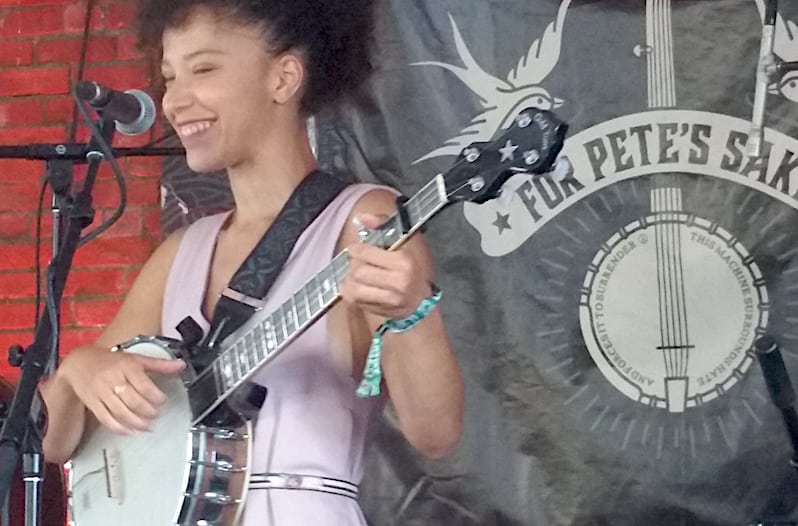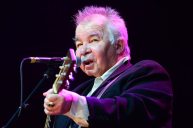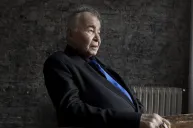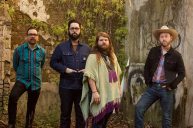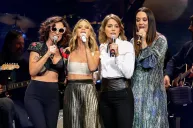You may not be aware of the Newport Folk Festival's origins, but you are probably aware of its impact on Americana music. It's where Dylan went electric. But when it was founded in 1959 by George Wein, it became an instant clearing house of the day's top folk music acts. In fact, at this year's festival, just shy of its 60th anniversary, the state of Rhode Island signed a deal with the foundation guaranteeing that the festival would remain in Fort Adams State Park for the next 40 years.
The festival is known for surprise guests, incredible lineups, and even better guest appearances and collaborations. For your reading pleasure, here's what I did on my summer vacation. Unless otherwise attributed, the photos are mine.
Day 1: Amanda Shires
https://www.instagram.com/p/BlwSlh2gVWR
We got to the fort later than we'd planned, so we basically booked it over to Amanda Shires' set. I didn't catch the names of the folks in her band, but I've seen enough of them touring with other artists I love to confidently inform you that they're some of Nashville's best. Shires mostly played music from her upcoming album To The Sunset, though unfortunately the sound was a bit...lacking, so it was difficult to drink in the lyrics. However, Shires looked like she was having the time of her life playing it and I was enjoying listening to her muscular rock'n'roll-infused country music. She invited Mr. Shires on to the stage for the last few songs, who of course tore it up on some searing solos. But Shires owned the stage and, once the album drops, will command so much more.
Margo Price
We caught the first few songs of Tyler Childers' set, but the tent's overflow crowd was so big that security gave up on trying to clear the fire exits. I didn't particularly care for Midwest Farmer's Daughter so I skipped All American Made. Reader, that was a big mistake.
For me, Price's set was the highlight of the entire festival. I knew I was in for something special when John Prine came on stage to personally introduce Price. He would later join her for a duet of his song "In Spite of Ourselves." But not before Price sang the hell out of her own catalog, including handing off her guitar mid-song and playing a dueling drum duet that would put Animal from the Muppets to shame.
As Price, only barely winded, made her way to her piano, she noted that hopefully soon, festivals would "get it right" and book more women headliners. She then launched into a stark rendition of "Made in America," adding these lines:
Yes I did, thanks for listenin ?? it was:
I wonder how the President gets any sleep at night// and if the folks down on the boarder are making it alright//but I?m dreaming of that highway and it stretches out of sight// and it?s all American made #KeepFamiliesTogether https://t.co/nezF3theLB— Margo Price (@MissMargoPrice) July 29, 2018
The crowd, for the most part, went wild. Few artists could pull a crowd of hundreds into a somber song in the middle of a sunny 80-degree afternoon, but Price did it. Once the last notes died, Price thanked the audience for their attentiveness, noting that there were places where she felt she couldn't perform the song.
That wasn't the last trick up her sleeve, though. Price brought out Brandi Carlile, who seemed to be everywhere this past weekend, for an off-the-cuff duet of Dolly Parton's "9 to 5."
Given the recent activism supporting women and country music — not to mention the recent backlash to other artists voicing their political opinions — Price's protest might have been nothing new for the Newport crowd, but it represents a powerful shift in the way artists plan to conduct themselves in Nashville.
Ben Harper and Charlie Musselwhite
I haven't seen much mention of this set, nor would my pictures do it any justice at all. Yes, I skipped Sturgill to see this. Living history doesn't happen every day. Musselwhite is, of course, the preeminent blues harp player and Harper is certainly holding up his end of continuing the tradition of electrifying blues guitar players. The band received a standing ovation after every single song. I promise you it was well-deserved. They ripped through blues standards and originals, forcibly illustrating the power of live music.
Annie Clark (St. Vincent)
I can't tell you why Annie Clark was at this festival. That's not to say she didn't belong — just that her inclusion was somewhat mystifying. I also can't tell you why she dragged a grand piano on stage with her even though she played her signature custom guitar at the Panorama Festival in New York City the very next day. I can tell you that her pianist did some extremely cool things with the piano, such as reaching inside it to mute the strings as he played, transforming what would have been Clark's angular guitar lines into tense staccatos that heightened Clark's own urgency. Also, when you schlep your girlfriend 179 miles to a folk music festival, you go with her to the one name she's super excited about.
Jason Isbell
I was the most excited to see Jason Isbell play — simply because I was the most familiar with his work. The band immediately launched into an anthemic reading of "Hope the High Road" that emphasized the song's Southern rock angle. Needless to say, the band blue out the PA for Newport's main stage. I loved the song when the album first came out. I was thrilled when comedian Rhea Butcher used the song as the opening to their baseball podcast Three Swings. Shortly after that, Butcher came out as nonbinary and the song's indictment of toxic masculinity and racism have since taken on new meaning for me.
Speaking of recontextualized songs, Isbell brought out his personal hero David Crosby to perform blistering versions of "Wooden Ships" and "Ohio." Isbell called for us to remember how songs bind us to the past and the future. He also observed that it's worth the effort to try to make things better, even if you don't succeed. Given the ominous cast to our politics these days, "Ohio" felt particularly meaningful.
Day 2: Kaia Kater
Saturday was a little less action-packed for me and a little more focused on smaller acts. First up was Kaia Kater, a Canadian singer-songwriter whose banjo playing is rivaled only by her voice. Kater was at ease with the early-morning crowd, even exhorting audience members to waltz. Her accompaniest, a gifted standup bass player named Andrew Ryan, also played hambone (a form of percussion using one's own body) on Kater's original song "Harlem's Little Blackbird." Kater deftly blends bluegrass, folk, and jazz — no wonder she'll be releasing her next album through Smithsonian Folkways. She also earned herself a standing ovation. Perhaps of greater importance, she single-handedly converted bae into a folk music lover.
Valerie June
"My music is iridescent, sparkly, a little funky, and OH YEAH — IT'S GOT SOUL!" Valerie June more or less summed up her own set in its triumphant climax. This was another one of bae's picks — and it was clutch. I knew June to be fun and a bit eccentric, but I didn't appreciate the extent to which she could wail. If June passes through your town, you owe it to yourself to see the author of "Working Woman Blues."
June's music emphasizes self-love and an appreciation for the world at large. Or, to put it June's way, we all have a unique color signature on the astral plane and we all "came here to shine!" June's live show is a transcendent celebration of love and joyful existence. That doesn't mean life's always good, but the next day is full of potential to be better than the last.
Patrick Haggerty and JP Harris
The names were flipped on the official bill, but if we're being honest it was Haggerty's show and Harris was along for the ride. JP Harris was tasked by Smithsonian Folkways to curate a showcase for the Newport Folk Festival. Harris was interested in pairing older and younger singer-songwriters, but he may have gotten a little more than he bargained for by sharing the bill with Lavender Country's Patrick Haggerty, the first known openly gay country singer.
Harris kicked off the set with a delightful blue song about cowboys' inner cowgirls and cowgirls' inner cowboys — and how those yearnings are expressed. Once Haggerty took hold of the mic, he took hold of the show. I've seen Haggerty perform a few times now, but his stage presence never fails to raise the hairs on my arms. After all, his story does feel like something of a miracle. Having grown up in a rural town in Washington, his father accepted him for who he was but exhorted him to go to the city before he got killed. Haggerty's had a long life devoted to activism, with his one-off album Lavender Country in 1973 one stop along the way. However, I know that the album's rediscovery has meant the world to him, and seeing him realize a lifelong dream of being recognized as a legitimate artist filled me with pride.
The audience picked up on the import of the show, too, giving Haggerty a roaring standing ovation after each of his four songs. Haggerty, of course, isn't the first queer artist to perform at Newport — he wasn't even the only queer performer this weekend (though he was the only man.) But he certainly took the longest route to get here.
